
Markus S'der, (CSU), Minister President of Bavaria and CSU Chairman; Friedrich Merz, Union candidate for Chancellor and CDU Federal Chairman; Lars Klingbeil, SPD Parliamentary Group and Federal Chairman; and Saskia Esken, SPD Federal Chairman, take part in a press conference, Berlin, Germany, March 8, 2025. /VCG
Markus S'der, (CSU), Minister President of Bavaria and CSU Chairman; Friedrich Merz, Union candidate for Chancellor and CDU Federal Chairman; Lars Klingbeil, SPD Parliamentary Group and Federal Chairman; and Saskia Esken, SPD Federal Chairman, take part in a press conference, Berlin, Germany, March 8, 2025. /VCG
The parties negotiating Germany's next coalition government have reached an agreement in their exploratory talks, according to conservative bloc leader Friedrich Merz on Saturday.
Merz's center-right Christian Democratic Union (CDU) and its sister party, the Christian Social Union (CSU), will now move to formal negotiations to form a government with the center-left Social Democrats (SPD) of Chancellor Olaf Scholz, the parties agreed.
The exploratory talks lasted for over a week after the federal election on February 23. Merz is expected to become Germany's next chancellor and has previously spoken of plans to revive Europe's top economy and its armed forces after U.S. President Donald Trump rocked trans-Atlantic relations by casting doubt on the future strength of the NATO alliance.
Speaking at a news conference in Berlin, Merz said the agreement had been reached on a wide range of substantive issues.
Regarding migration, the parties agreed on the possibility of rejecting asylum seekers at land borders and strengthening border controls.
They also agreed to reform the social benefits system for the unemployed.
According to the announcements, the two parties would also focus on reducing energy costs to boost the country's economy.
Earlier this week, the CDU/CSU and the SPD announced an agreement on a 500 billion euro ($542 billion) package to provide infrastructure investments, as well as a plan to exempt defense spending from the constitutionally enshrined debt brake.
(With inputs from agencies)